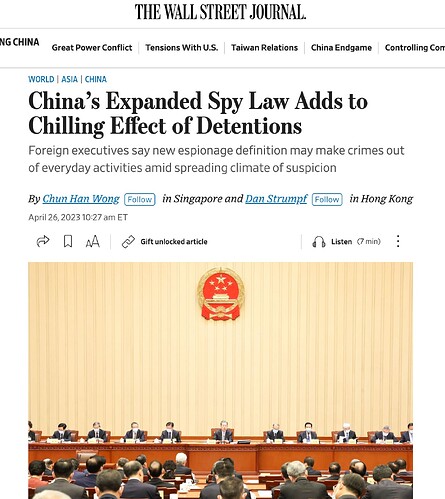-
中国修订了其反间谍法,以扩大国家安全的定义,并加强国家对数据和数字活动的控制。
-
外国高管担心,该法可能将日常互动变成国家安全犯罪,为外国企业创造一个敌对的环境。
-
这些修订是在外国公司员工被拘留以及中国当局扣押台湾出版商和一名党报专栏作家的消息曝光后进行的。
-
这部法律加强了领导人习近平加强对安全机构的监督和保护国家利益不受外国审查的动力。
-
它反映了对外国和中国实体的怀疑和压力增加的气氛。
-
3月,当局拘留了一名日本制药商的雇员,并搜查了一家位于纽约的尽职调查公司的办公室。
-
对法律的修改赋予当局更大的执法权力,打击网络威胁,并使任何数据或文件都要接受检查,以确定对国家安全的潜在风险。
-
它将任何对中国国家机关进行网络攻击的人列为间谍。
-
反间谍法和相关的国家安全立法引发了美国和其他西方国家的担忧,即公司可能被要求向中国安全官员提供信息。这种权力凸显了禁止TikTok的呼声,或迫使其中国所有者出售这一流行的短视频应用程序。修订后的法律让人担心,正常的商业活动,如收集关于当地市场、竞争对手和商业伙伴的情报,可能会被纳入扩大的间谍定义中。
-
根据向公众提供的反间谍法的最新修订草案,修订后的法律将受保护的信息从之前单纯的 "国家机密和情报 "扩大到包括所有 “与国家安全有关的文件、数据、材料或项目”。修订案还扩大了法律所针对的活动类型,包括提供有关通信基础设施安全漏洞的信息。邮政和快递服务、电信运营商和互联网服务提供商将被要求向国家安全机构提供技术援助以打击间谍活动。
-
7月1日生效的法律还将授权中国政府机构和各级媒体开展宣传活动,以提高对间谍活动的认识和反击此类活动的方法。这引起了人们的担忧,即外国高管将无法代表他们的公司收集足够的信息,因为他们担心被打成间谍人员。
-
China revised its law against espionage to expand the definition of national security and increase state control over data and digital activities.
-
Foreign executives are concerned that the legislation could turn everyday interactions into national-security offenses, creating a hostile environment for foreign businesses.
-
The revisions follow detentions of employees at foreign companies and revelations that Chinese authorities are holding Taiwanese publisher and a party-newspaper columnist.
-
The law bolsters leader Xi Jinping’s drive to strengthen oversight of the security apparatus and shield national interests from foreign scrutiny.
-
It reflects an atmosphere of increased suspicion and pressure on foreign and Chinese entities.
-
In March, authorities detained an employee of a Japanese drugmaker and raided the offices of a New York-based due diligence firm.
-
Changes to the law give authorities greater enforcement powers, counter cyber threats and make any data or documents subject to examination for potential risks to national security.
-
It classifies anyone carrying out cyberattacks against Chinese state organs as a spy.
-
The counterespionage law and related national security legislation have prompted concerns in the U.S. and other Western countries that companies could be required to provide information to Chinese security officials. Such powers have underscored calls to ban TikTok, or to force its Chinese owners to sell the popular short-video app. The amended law raises concerns that normal business activities, such as gathering intelligence on local markets, rivals and business partners, could be swept up in the broadened definition of espionage.
-
According to the most recent draft changes to the counterespionage law available to the public, the revised legislation expands protected information to include all “documents, data, materials or items related to national security” from simply “state secrets and intelligence” beforehand. The revisions also expand the types of activities targeted under the law to include providing information on security vulnerabilities in communications infrastructure. Postal and courier services, telecommunications operators and internet service providers would be required to provide technical assistance to state-security agencies for combating espionage.
-
The law, which takes effect July 1, will also mandate Chinese government agencies and media outlets at all levels to conduct publicity campaigns to promote awareness of espionage and ways of countering such activities. This has caused worries that foreign executives will be unable on behalf of their companies to gather sufficient information for fear of being branded an espionage agent.
